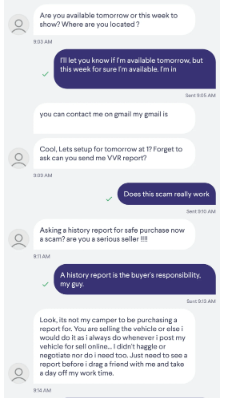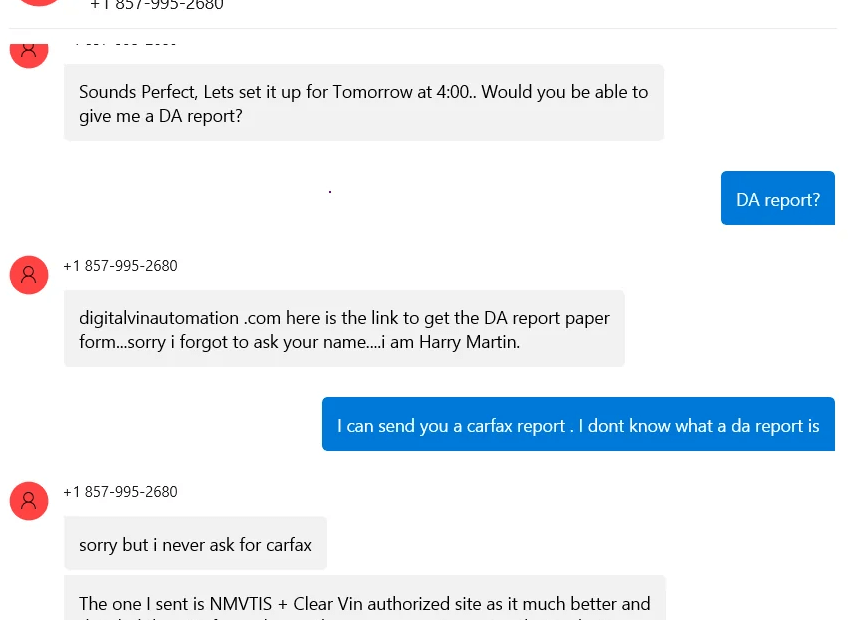What are Vehicle History Report Scams?
Vehicle history report scams involve misleading sellers into purchasing bogus car history reports from specific websites. These scams often occur in the used-car buying process, particularly for independent sellers using online classifieds.
How Do Vehicle History Report Scams Work?
In vehicle history report scams, a potential buyer, often a private buyer, requests the seller to obtain a report from a particular website. These scam websites may steal money or personal information, such as vehicle identification numbers and bank account credentials.
It’s important for sellers to be cautious when contacted via these channels and to verify the legitimacy of any requests for vehicle history reports, especially if directed to a specific website for obtaining these reports.
How Can Sellers Avoid Vehicle History Report Scams?
To avoid vehicle history report scams, sellers should be cautious if a prospective buyer insists on using a specific website for the report. It’s safer to choose reputable sources for vehicle history checks and confirm their legitimacy on BBB.org.
what websites do scammers use to contact sellers with fake report scams?
Scammers using fake report scams typically contact sellers through a variety of online platforms. The most common websites they use include:
- Online Classifieds: Websites like Craigslist, eBay Classifieds, Kijiji and Facebook Marketplace are frequent hotspots for scammers to find and contact sellers.
- Social Media Platforms: Scammers also use social media platforms, such as Facebook groups, Twitter, and Instagram, Telegram, Discord, and Reddit to identify and reach out to potential sellers.
- Automotive Sales Websites: Platforms specifically for selling vehicles, such as AutoTrader and Cars.com, can also be used by scammers.
- Forums and Community Boards: Automotive forums and community message boards are other avenues where scammers might find and contact sellers.
Recognizing and Avoiding Scams in Vehicle History Reports
When selling or buying a car, it’s crucial to rely on vehicle history reports from reputable sources. Be skeptical of requests to use specific websites for obtaining these reports, especially if they are unknown or have a history of complaints for fraud. Always conduct due diligence, such as checking with BBB.org or law enforcement agencies, before proceeding with any transaction.
HOW DO VEHICLE HISTORY REPORT SCAMS OPERATE?
Vehicle history report scams have become a pressing concern in the used-car buying process, particularly affecting independent sellers and potential buyers using online classifieds like Facebook Marketplace. These scams typically involve bogus car history report websites that mislead consumers seeking genuine vehicle history information.
Scammers, posing as prospective buyers, often contact sellers through texts or online platforms. They express interest in purchasing a vehicle but insist on receiving a vehicle history report from specific, often dubious, history report websites. These scam websites, disguised as legitimate providers of vehicle history, may offer fake, altered, or alternative reports.
What Are the Risks of Vehicle History Report Scams?
The primary risk involves unsuspecting customers being tricked into purchasing bogus reports for marketing purposes or divulging sensitive information like vehicle identification numbers, bank account credentials, and insurance details. In some cases, these websites might be a front for collecting data for parties for advertising or more nefarious cyber activities.
What was the Experience of a Victim of Vehicle History Report Scams?
Victims like James Van Roosendaal, who have experienced these scams firsthand, often report the incident to platforms like BBB.org/ScamTracker. Consumer Reports and other consumer advice forums regularly highlight the prevalence of such scams, reinforcing the need for caution.
Carole Fraze, a victim of a vehicle history report scam, lost $26 and her personal information to a scammer. She discovered the scammer was the website’s owner after purchasing a fake vehicle history report
What Do Legitimate Vehicle History Reports Include?
Legitimate vehicle history reports from reputable sources, such as NMVTIS-approved providers, contain detailed information including accident history, service history, previous ownership, and details from police reports. They also verify VIN plates and provide a comprehensive background check of the vehicle.
How to Verify the Legitimacy of Vehicle History Report Providers?
To ascertain whether providers like vehicle records.net, vinreports.co, or vinnerfax are legitimate, consumers should look for reviews, verify their status on consumer protection sites, and check if they are listed as NMVTIS-approved providers. Contacting the provider directly, for instance through [email protected], can also be a step in verification.
Vehicle History Scams as Reported by Redditors
Reddit, a popular online platform, has become a valuable resource for sharing and identifying various scams, including those related to vehicle history reports. Several Redditors have reported encountering scams where they were directed to dubious websites under the guise of obtaining vehicle history reports.
Reported Scam Websites
Based on Redditor experiences, the following websites have been identified as part of vehicle history report scams:
- Vinnerfax: This site has been mentioned in Reddit discussions as a part of a scam where sellers are asked to provide a vehicle history report from this specific site.
- Vehicle Audit Reports.com: Another website that has been flagged by users on Reddit, where scammers direct sellers to get reports supposedly for verification purposes.
- Vinhistorylimited.com: This site has been cited in Reddit threads as a fraudulent website used by scammers requesting vehicle history reports.
- Vinhistory.com: Similar to the above, this website has been reported by Redditors as being used in scams involving vehicle history.
- Digitalvinautomation: This site has appeared in scam reports on Reddit, where users were misled into purchasing vehicle reports.
- Autoreportslab.com: Mentioned in Reddit discussions, this website has been identified as part of vehicle history report scams.
- Cav Paper Work: Although not a website, this term has been used in scams related to vehicle paperwork and history reports, as reported by Redditors.
- Vinnervehiclehistory.com (TVR): This particular website was noted in scam incidents shared by Reddit users, often linked to fake vehicle history report requests.
- WA Reports and VR Reports: These sites have been brought up in Reddit discussions as platforms that scammers use to exploit unsuspecting sellers.

Common Patterns in Scams
The general pattern observed in these scams involves a potential buyer, usually contacting a seller on platforms like Craigslist or Kijiji, and insisting on obtaining a vehicle history report from one of these specific websites. Once the seller purchases the report, the scammer typically cuts off all contact, leaving the seller with a fraudulent report and out of pocket expenses. In addition to vehicle history report scams, sellers should watch for overpayment scams, buyers not viewing the vehicle, and fraudulent payment offers, like eBay’s Vehicle Purchase Protection program used outside eBay.com.
Some VIN scams operate by offering an initially low price for a vehicle history report, which can be misleading. These scams often involve a setup where the buyer, believing they are paying a one-time fee for a single report, is actually being enrolled in a monthly subscription service. This deceitful practice hinges on the fact that many customers may not thoroughly read the terms and conditions before making a purchase.
In these scenarios, the terms of service or purchase agreement may include clauses that authorize the company to charge the customer’s credit card on a recurring monthly basis. Since these details are often buried in fine print or presented in a way that is not clear, customers might not realize they are agreeing to ongoing charges.
The result is that instead of making a one-off payment for a report as intended, customers find themselves charged multiple times, typically every month, leading to unexpected expenses. These repeated charges continue until the customer notices and takes action to cancel the subscription, which can sometimes be a complicated process.
It’s crucial for consumers to exercise diligence when purchasing VIN reports online. This includes carefully reading all terms and conditions, being wary of offers that seem unusually low-priced, and monitoring bank statements for any recurring unauthorized charges.
Redditors’ Advice on Avoidance
Advice from Redditors emphasizes the importance of using well-known and reputable sources for vehicle history reports. They suggest being wary of any potential buyer who insists on using a specific, unfamiliar website for obtaining a vehicle report. Checking the legitimacy of such websites and being cautious of any requests that seem out of the ordinary is crucial in avoiding these scams.
In conclusion, staying informed and vigilant about these scams, as shared by experiences on Reddit, is key to protecting oneself when selling a vehicle online.
What is NMVTIS and How Does it Help in Vehicle History Reports?
The National Motor Vehicle Title Information System (NMVTIS) is a division of the Department of Justice providing a list of NMVTIS-approved providers for vehicle history reports. NMVTIS reports include vehicle title information, status (junk, salvage, flood), odometer readings, and transfer or sale to recyclers.
Where Can You Find More Information on Online Sales Scams?
For more information on online sales scams, visit BBB.org. Victims of vehicle purchase scams can report incidents on BBB.org/ScamTracker and find advice at BBB.org/ScamTips. The Better Business Bureau has been assisting people in finding reliable businesses and charities for over 100 years. In 2019, BBB provided profiles for 5.8 million businesses and 11,000 charities, supported by over 4,100 Accredited Businesses committed to BBB’s Standards of Trust.
Conclusion
In the realm of buying and selling cars to consumers, understanding the risks of vehicle history report scams is crucial. Independent sellers and private buyers must be vigilant, relying only on reports from legitimate and reputable providers to ensure the accuracy of the vehicle’s history and to safeguard personal and financial information.

